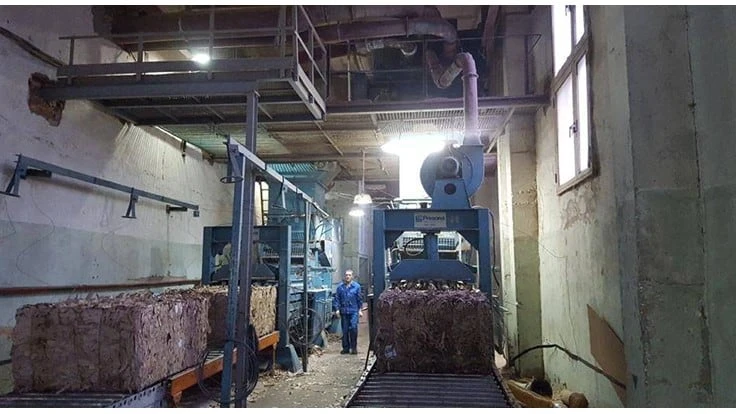
Photo courtesy of Presona AB.
Manufacturers of balers exist in part, naturally, to make and sell new machines to existing and prospective new customers. To do so, however, they also design and make balers that are so reliably good at what they do that their customers keep the machine running for decades.
Baler makers have found that there is far more good than harm in making a machine that stands the test of time, as such units provide benefits that include a long-lasting customer relationship, prospective customer site visits to see the baler, and testimonials from the happy customer that serve as outstanding marketing material.
On either side of the Atlantic Ocean, baler manufacturers recently pointed to customers who have kept a baler on the job for from 35 to 40 years.
In the United States, Asheville Waste Paper in North Carolina has a decades-old machine made by Ohio-based American Baler Co. helping prepare its recovered fiber for shipment.
In a recent advertorial piece prepared by Recycling Today, Asheville Waste Paper Chief Administrative Officer Gabe Pace says the nearly 40-year-old single-ram horizontal baler from American Baler has helped to keep things going when other machines were broken. “It got us through the hard times; that machine has held up for us, and we are very happy with it,” says Pace.
In Dunkerque, France, Triselec Dunkerque is using a 40-year old baler made by Netherlands-based Bollegraaf. According to a Bollegraaf recounting of the baler’s four-decade journey, the HBC50 extrusion baler left the Bollegraaf factory in Appingedam in 1980 “to start its career in cardboard, paper, plastic and aluminum baling.”
The baler’s owner in its first 19 years was the Gero Genemuiden recycling firm in the Netherlands. In 1999, the baler was retrofitted before being resold to Triselec Dunkerque, which has “been using it ever since,” according to Bollegraaf.
Triselec bales sorted municipally collected materials, about 20,000 tons per year of which comes from a program operated by the Community of Dunkerque. “Together, Bollegraaf’s HBC50 and Triselec are working to achieve Triselec’s guiding principle: to support the circular economy,” says Serge Roulez, head of research and development at Triselec.
Adds Roulez, “The HBS50 is easy to maintain and operate. It’s a reliable piece of equipment. On average, the baler operates six days a week, every week of the year. The machine produces approximately 80 bales per day and has already created 1 million bales since leaving the factory. The combination of professional preventive maintenance, a high-quality product and skilled operators results in a baler that’s up to the task (almost) every day.”
Balers made by U.S.based Harris, a 130-year-old company, have long had significant global market share. Harris spokesperson Holly Waters says a Harris HRB 3B model built in the early 1970s and an HRB-8-NF unit built in 1985 are both in service at Montgomery Paper in Dayton, Ohio. “They use both every day, and run one of the best paper recycling operations I’ve ever seen,” says Waters.
Another American firm operating a decades-old Harris baler to recycle fiber is Waste Pro at a location in Atlanta. (In the metals sector, recyclers including Indiana-based OmniSource Corp. and two American locations of United Kingdom-based EMR Ltd. also have decades-old Harris machines, notes Waters.)
Sweden-based Presona AB says one of its customers in that nation uses a Presona model made in 1987 to bale cardboard packaging, while two overseas customers also have durable units on the job.
According to Presona spokesperson Jesper Hultqvist, old corrugated containers (OCC) recycler Lautus in Latvia is running a Presona LP 50 VH2 that was made in 1990. In Russia, Moscow-based PAO Gofron is using a Presona LP 40 EH2, also made in 1990, to bale OCC and other board grades.
Germany-based baler manufacturer Paal, which was acquired by Massachusetts-based Kadant Inc. in 2016, becoming Kadant-Paal, has a lengthy list of veteran balers on the job.* (Eugene, Oregon-based Bulk Handling Systems (BHS) represents the line in the U.S. and Canada.) “For decades Paal has (and still does) single-handedly led Europe in market share in the recycling space,” says Craig Heley and Hubert Stricker of Kadant-Paal.
The duo prepared a list of long-serving Paal balers that includes five balers made in the 1980s:
- a Konti model 425 B made in 1985 and on the job in North Africa (in Morocco) with nearly 48,000 operating hours recorded;
- a Konti model 600 B S working in Chatillon, France, with more than 100,000 operating hours under its belt;
- another Konti 600 B working in Tours, France, with some 71,000 operating hours;
- a Konti 325 B model in the south of France with more than 46,500 operating hours logged; and
- a LIKON 350 baler in Dijon, France, with nearly 36,000 operating hours recorded.
Attention to maintenance plays a leading role in the longevity of even the best-made baler. Sidney Wildes of United States-based Waste 2 Solutions offers his thoughts on that topic in this 2019 Recycling Today article, while long-time recycling plant operations manager Robb Espinosa offers another perspective on the same topic in his 2015 Recycling Today contribution.
*BHS originally was misstated as the owner of the Paal line.
Latest from Recycling Today
- AF&PA report shows decrease in packaging paper shipments
- GreenMantra names new CEO
- Agilyx says Styrenyx technology reduces carbon footprint in styrene production
- SABIC’s Trucircle PE used for greenhouse roofing
- Hydro to add wire rod casthouse in Norway
- Hindalco to invest in copper, aluminum business in India
- Recycled steel price crosses $500 per ton threshold
- Smithers report looks at PCR plastic’s near-term prospects






